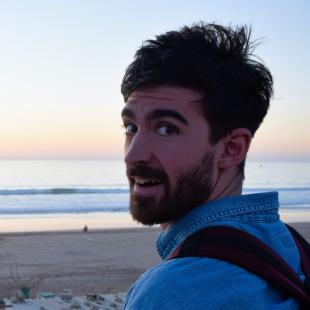Early post-grad career
Andrea came to IDCORE from a product design company in Cambridge, where he had been focussed on taking products from concept through the early development process for large consumer or medical sector companies. He had been enjoying the work but hadn’t felt really invested in it. He came across IDCORE through a chance encounter with a student already on the course and felt it would be a good way to develop an interest he already had in the renewables sector.
It was the unique structure of the IDCORE programme that appealed to Andrea, particularly given the background he was coming from, which included a first degree in Engineering Science from the University of Oxford.
Quote: Andrea Caio, Business Development Manager, Mocean Energy
‘I can't think of a time when I haven't recommended IDCORE to others. I have always found that saying I’ve been part of IDCORE has given me credibility. It is a very well respected programme.
The initial training year was a great introduction to the sector, providing a taste of lots of different aspects of offshore renewable design, and delivering a baseline understanding of the fundamentals that ultimately helps you shape your own project. Importantly for me, this provided a way into the sector without me needing to have any specific knowledge.
IDCORE also allowed me to take a risk. I didn’t know where it might lead, but I saw joining the Centre as a ‘no regrets’ decision that could open the door to opportunities that I wouldn’t otherwise have been able to access.
I finished up delivering an exciting project for Mocean Energy, a start-up wave energy technology developer, and I’ve never left.’
Why Mocean Energy?
Andrea was a member of one of the smaller cohorts that have gone through the IDCORE programme. At the point of project allocation there were only five researchers in his cohort and, other than Mocean, all of the potential project sponsors were large organisations.
He wanted to be involved in wave energy and, at the interview, he got on well with Mocean’s co-founders. It seemed like a flexible project that he would be able to shape, and joining a smaller organisation allowed him to make the most of the IDCORE opportunity – there are plenty of other routes into large organisations. Geography also played a part in his decision.
Mocean’s relationship with IDCORE has been an important part of their growth strategy - they are still sponsoring projects in current cohorts. In Andrea’s case, his development has become entwined with this growth story. When he completed his project, Mocean was at a point where they wanted to build their commercial team with someone from a technical background – it was a natural fit for Andrea.
However, being part of a small company means that his work is varied. He still gets involved in R&D, for example linking commercial drivers to evaluation criteria and physical testing, using approaches he developed as part of his EngD project.
EngD Project
Initially, Andrea’s IDCORE project was going to provide numerical modelling support for a novel wave energy converter concept that Mocean was developing. However, the start of the project overlapped with some testing that they were undertaking at FloWave and Andrea was asked to support those tests.
He quickly discovered that there was a need within the programme for skills in computer-aided design, ideation and physical modelling that he had developed in the work he was doing before joining IDCORE. Consequently, his project changed focus, becoming an exploration and optimisation of physical modelling techniques, while linking these to emerging evaluation criteria.
Generally, from a developer’s perspective, the ability to undertake tank testing is limited by constraints of time, cost and facility availability. When test slots are available, the developer will want to gather data as efficiently and accurately as possible; getting the scale of the model right and using the most appropriate facilities for each type of testing are key to this. For example, there is a difference between the physical modelling scales needed to test performance and that needed to test survival of a device in different sea states. Typically, as a developer advances the maturity of their technology, so too the scale of model that they need to test increases, but there is room to challenge this norm.
Andrea’s EngD project helped to define some of these parameters for Mocean, in order to accelerate their test programmes and reduce the costs involved. It is not surprising that they didn’t want to lose him.







